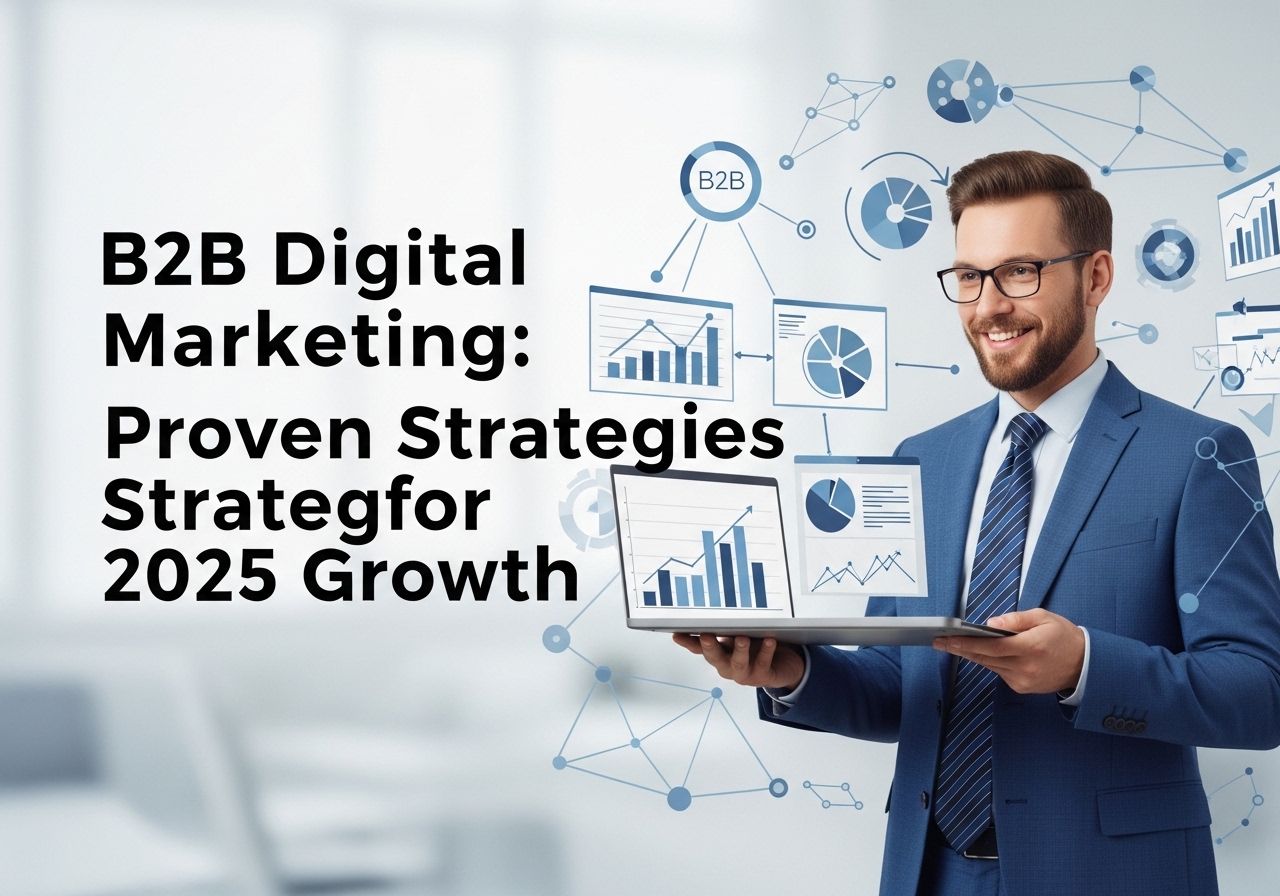Did you know that the lack of effective marketing is one of the primary reasons tech startups have the highest business failure rate of any industry? Even with a groundbreaking product, without the right marketing strategy, your startup might become just another statistic. But here’s the good news: with strategic planning and smart execution, your startup can break through the noise and achieve sustainable growth in 2025.
Building Your Startup Marketing Foundation
The journey to effective startup marketing begins with laying a solid foundation. Consequently, before diving into tactics and channels, you need to establish the core elements that will guide all your marketing efforts.
Know Your Audience Inside Out
Indeed, marketing to everyone means marketing to no one. The most successful startups understand exactly who their ideal customers are and what keeps them up at night.
Therefore, research your target audience thoroughly to identify:
- Their specific pain points and challenges
- Where they spend their time online and offline
- What motivates their purchasing decisions
- How your solution uniquely addresses their needs
Moreover, creating detailed buyer personas keeps your ideal customers top of mind during all marketing activities. Assess demographics such as age, gender, income, and education to better relate to their challenges. Remember that you’re building relationships with your customers, not just pursuing quick sales.
Craft a Magnetic Brand Message
With thousands of marketing messages bombarding consumers daily, your startup needs to stand out with clear, compelling messaging. In fact, your brand message should:
- Clearly communicate your unique value proposition
- Resonate emotionally with your target audience
- Be consistent across all marketing channels
- Make your messaging magnetic by focusing on the transformation your product enables, not just its features
Set Clear Marketing Goals and KPIs
Before allocating a single dollar to marketing, define what success looks like for your startup. Specifically, set SMART (Specific, Measurable, Achievable, Relevant, Time-bound) goals that align with your overall business objectives.
Your marketing KPIs might include:
- Customer acquisition cost (CAC)
- Conversion rates at different funnel stages
- Website traffic and engagement metrics
- Social media growth and engagement
- Lead generation numbers
- Customer lifetime value (CLV)
High-ROI Marketing Channels for Startups
Not all marketing channels deliver equal returns, especially for resource-constrained startups. So, let’s explore the most effective channels and how to optimize them for maximum impact.
Content Marketing and SEO: The Long-Term Growth Engine
Content marketing forms the backbone of sustainable digital marketing for startups. Unlike paid acquisition, content delivers compounding returns over time, thereby building both authority and organic traffic.
To implement an effective content strategy:
- Identify high-intent keywords with reasonable competition
- Create comprehensive content that genuinely solves user problems
- Build topic clusters around your core product value propositions
- Optimize for featured snippets and position zero opportunities
- Regularly update and refresh content to maintain rankings
The key mistake many startups make is creating content that’s easy rather than valuable. For instance, generic “thought leadership” rarely drives acquisition. Instead, focus on content that serves specific customer needs at different funnel stages:
- Top of funnel: Educational content addressing industry problems
- Middle of funnel: Solution comparisons and case studies
- Bottom of funnel: Product documentation and implementation guides
For example, a fintech startup saw three times more qualified leads from their detailed guide on “Regulatory Compliance for Payment Processors” than from general fintech trend articles, despite lower overall traffic numbers.
Social Media Marketing: Focus Over Omnipresence
Social media can be either a time sink or a growth engine for startups, depending on your approach. Importantly, the key is focus rather than omnipresence.
Instead of spreading yourself thin across every platform, identify where your audience actually engages and double down there. Consider these platform specializations:
- LinkedIn: B2B solutions, professional services, recruitment
- Twitter: Tech products, real-time customer service, industry networking
- Instagram: Visual products, lifestyle brands, community building
- TikTok: Youth-oriented products, viral potential, behind-the-scenes content
For early-stage startups, social media should focus on relationship building rather than broadcasting. Thus, engage authentically in relevant communities, provide value in conversations, and establish direct connections with potential customers and partners.
Furthermore, measure social media success beyond followers and likes. Track referral traffic, lead generation, and conversion rates to ensure your social strategy actually drives business outcomes.
Paid Advertising: The Growth Accelerator
If organic content is your marathon, then paid ads are your sprint. Platforms like Google Ads, Facebook, and Instagram let you target specific audiences, ensuring your message reaches the right people.
Additionally, AI-driven tools can optimize campaigns in real-time, analyzing performance and adjusting to maximize return on investment (ROI). Retargeting ads can also play a crucial role in re-engaging visitors who didn’t convert initially.
Success isn’t necessarily about being everywhere; it’s about being where your audience is. Whether you’re using social media for sales, creating SEO-optimized blogs, or running precision-targeted paid ads, aligning your marketing plan with your audience’s behavior ensures your message resonates where it matters.
Offline Marketing: Don’t Overlook Traditional Channels
While digital marketing dominates the conversation, offline marketing can still be highly effective for startups. Consider these offline marketing ideas:
- Networking events and industry conferences
- Direct mail campaigns targeting specific decision-makers
- Local community sponsorships
- Strategic partnerships with complementary businesses
These traditional marketing initiatives can help your startup stand out in an increasingly digital world and reach audiences that may not be as active online.
Creating an Effective Startup Marketing Budget
A well-planned marketing budget is essential for startup success. Here’s how to develop one that balances cost with potential growth.
Assess Your Financial Situation
Firstly, start by evaluating your startup’s current financial health. Review your balance sheet, income statement, and cash flow statements to understand if you’re operating at a profit or loss, how much cash you have on hand, and what your major expenses are.
Secondly, analyze your revenue forecasts for the upcoming year, basing projections on past sales data, market analysis, and industry trends. Understanding potential revenue will help you create a marketing budget that supports growth without overextending your financial resources.
Determine Your Marketing Allocation
Based on your financial analysis and revenue forecasts, decide how much your startup can afford to allocate to marketing. While there’s no one-size-fits-all number, a report found that the average marketing budget was about 9.5% of overall revenue in 2022.
Typically, startups allocate a higher percentage than established companies since building brand awareness and market presence is often more critical in the early stages of a business.
Allocate Funds Strategically
Once you’ve determined your overall marketing budget, allocate these funds across different marketing channels and activities. This allocation should reflect your target audience’s preferences and the marketing channels that have proven most effective for your business.
Importantly, keep your budget flexible. The market can change quickly, and your startup should be able to adapt its marketing strategy accordingly. Regularly review your marketing budget in the context of actual sales performance and market conditions, and be prepared to adjust as needed.
The 5-Step Startup Marketing Strategy for 2025
To bring everything together, here’s a comprehensive 5-step marketing strategy that’s fueling massive growth for startups in 2025:
1. Build Trust Before Traffic
Focus on establishing credibility and trust with your audience before obsessing over traffic numbers. This means:
- Creating high-quality, authoritative content
- Showcasing authentic customer testimonials and case studies
- Being transparent about your products and processes
- Delivering consistent value before asking for anything in return
2. Make Your Messaging Magnetic
Craft messaging that naturally attracts your ideal customers by:
- Speaking directly to their pain points and aspirations
- Using clear, jargon-free language
- Focusing on the transformation your product enables
- Testing different messaging approaches and refining based on data
3. Dial In Your Marketing Channels
Identify and optimize the marketing channels that deliver the best results for your specific business:
- Analyze where your customers actually spend their time
- Start with 2-3 core channels rather than trying to be everywhere
- Establish clear metrics for each channel
- Double down on what works and cut what doesn’t
4. Implement Data-Driven Optimization
Use data to continuously improve your marketing efforts:
- Set up proper tracking and analytics
- A/B test key elements like headlines, CTAs, and landing pages
- Review performance metrics weekly
- Make incremental improvements based on real user behavior
5. Scale What Works
Once you’ve identified effective strategies:
- Systematize successful processes
- Gradually increase budget allocation to high-performing channels
- Explore complementary channels that can reach similar audiences
- Maintain quality and consistency as you scale
Common Startup Marketing Mistakes to Avoid
Even with the best strategies, startups can fall into common marketing pitfalls. Consequently, here are some mistakes to avoid:
Trying to Be Everywhere at Once
Many startups make the mistake of trying to maintain a presence on every marketing channel. This approach, however, spreads resources too thin and results in mediocre performance across the board.
Instead, focus on being exceptional on one or two channels where your audience actually spends time. As Creative Strategy Head Himanshu Sawant advises, “Stick to one or two [channels] where your audience hangs out and go all in.”
Neglecting SEO Fundamentals
In the rush to generate immediate results, many startups underinvest in SEO. While SEO takes time to deliver results, it provides sustainable, cost-effective traffic in the long run.
Therefore, implement SEO best practices from day one:
- Conduct thorough keyword research
- Optimize your website structure and technical elements
- Create valuable, search-optimized content
- Build quality backlinks through genuine relationships
Misaligning Marketing and Product
Effective marketing starts with a product that genuinely solves customer problems. Indeed, no amount of marketing can compensate for poor product-market fit.
Before scaling your marketing efforts, ensure your product truly delivers value to your target audience. Collect and act on customer feedback to continuously improve your offering.
Conclusion: Your Path to Startup Marketing Success
Effective marketing for startups in 2025 isn’t about following trends or copying competitors—it’s about understanding your unique audience, focusing your limited resources on high-impact strategies, and consistently delivering value. For more insights and strategies, explore the CDM Suite blog.
By building a solid marketing foundation, choosing the right channels, allocating your budget wisely, and avoiding common pitfalls, your startup can achieve sustainable growth even in today’s competitive landscape. CDM Suite can help guide your journey.
Remember that marketing is both an art and a science. While data should inform your decisions, don’t lose sight of the human connection at the heart of all effective marketing. Your startup’s authentic story and genuine desire to solve customer problems will always be your most powerful marketing assets.
Ready to take your startup’s marketing to the next level? Find out EXACTLY what’s missing in your marketing strategy! Visit https://cdmsuite.com/free-3-minute-marketing-assessment-get-a-custom-growth-plan/ for a free 3-minute marketing assessment and get a custom growth plan tailored to your startup’s unique needs and goals.



